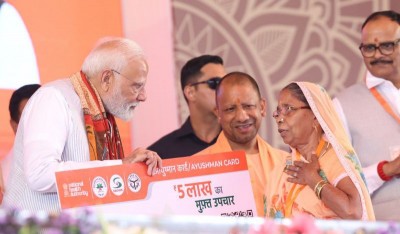 Recruitment
Recruitment
Cabinet approves setting up of National Recruitment Agency to conduct Common Eligibility Test
New Delhi: The Union Cabinet chaired by Prime Minister Narendra Modi has given its approval for creation of National Recruitment Agency (NRA), paving the way for a transformational reform in the recruitment process for central government jobs.
Recruitment Reform - a major boon for the youth
At present, candidates seeking government jobs have to appear for separate examinations conducted by multiple recruiting agencies for various posts, for which similar eligibility conditions have been prescribed.
National Recruitment Agency (NRA)
A multi-agency body called the National Recruitment Agency (NRA) will conduct a Common Eligibility Test (CET) to screen/shortlist candidates for the Group B and C (non-technical) posts. NRA will have representatives of Ministry of Railways, Ministry of Finance/Department of Financial Services, the SSC, RRB & IBPS.
Access to Examination Centres
Examination Centres in every District of the country would greatly enhance access to the candidates located in far-flung areas.
Major Relief to poor Candidates
Presently, the candidates have to appear in multiple examinations conducted by multiple agencies.
Women candidates to benefit greatly
Women candidates especially from rural areas face constraints in appearing in multiple examinations as they have to arrange for transportation and places to stay in places that are far away.
Bonanza for Candidates from Rural Areas
Given the financial and other constraints, the candidates from rural background have to make a choice as to which examination they want to appear in.
CET Score to be valid for three years, no bar on attempts
The CET score of the candidate shall be valid for a period of three years from the date of declaration of the result.
Standardised Testing
NRA shall conduct a separate CET each for the three levels of graduate, higher secondary (12th pass) and the matriculate (10th pass) candidates for those non-technical posts to which recruitment is presently carried out by the Staff Selection Commission (SSC), the Railway Recruitment Boards (RRBs) and by the Institute of Banking Personnel Selection (IBPS).
Scheduling Tests and choosing Centres
Candidates would have the facility of registering on a common portal and give a choice of Centres. Based on availability, they would be allotted Centres.
Multiple languages
The CET would be available in a number of languages. This would greatly facilitate people from different parts of the country to take the exam and have an equal opportunity of being selected.
Scores – access to multiple recruitment agencies
Initially the scores would be used by the three major recruitment agencies.
Shortening the recruitment cycle
A single eligibility test would significantly reduce the recruitment cycle.
Financial Outlay
The Government has sanctioned a sum of Rs. 1517.57 crore for the National Recruitment Agency (NRA).
Support Our Journalism
We cannot do without you.. your contribution supports unbiased journalism
IBNS is not driven by any ism- not wokeism, not racism, not skewed secularism, not hyper right-wing or left liberal ideals, nor by any hardline religious beliefs or hyper nationalism. We want to serve you good old objective news, as they are. We do not judge or preach. We let people decide for themselves. We only try to present factual and well-sourced news.







